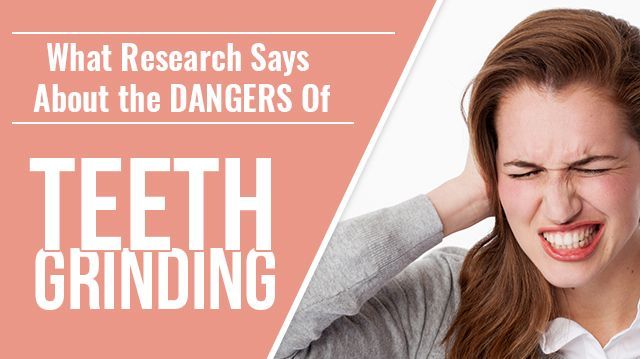
For those of you who have a partner that grinds their teeth in the night, you know how awful it can sound. Perhaps you even have woken yourself up before, with the sound of grinding resonating in your ears. Well, this “habit” is not only unpleasant to listen to and experience, it’s also potentially dangerous.
Signs that you’re grinding teeth
You may or may not know that you grind your teeth. Grinding and clenching of teeth, also referred to as bruxism, does not awaken everyone. If you are not aware of this behavior, you may also experience some other clear signs, including a sore jaw, unexplained wearing of your teeth or chips, earaches, tooth sensitivity, chewed tissue inside your cheeks and facial pain.
There are numerous possible causes of teeth grinding, the most common being stress. With that being said, frustration or tension could also result in teeth grinding. Not always, but often teeth grinders are hyperactive or aggressive by nature. In rare cases, it is a side effect of medications or a symptom of Parkinson’s.
No one wants to wear down their teeth or experience chronic headaches, but are there more serious concerns to be aware of? Based on the literature and a number of published studies, teeth grinding may be more than a disturbance to your sleep patterns and comfort levels.
What the research has to say
As you would imagine, tooth damage is one of the most common dangers of teeth grinding. When this condition is not treated, stress fractures almost always occur over time. In terms of the direct side effects associated with physically grinding your teeth, dull headaches and a sore jaw are the most common complications.
There are many individuals who experience chronic headaches. If you can relate, it’s important to understand the underlying cause. In one study, researchers examining patients with craniomandibular disorder found that bruxism and head pain were significantly higher within these patients in comparison to the control group.
Numerous studies have highlighted the damaging effects of bruxism in terms of tooth erosion and jaw pain, but this habit of clenching and grinding is threatening more than oral health and comfort levels. Since bruxism is often associated with stress and emotional instability, is it also a potential warning sign of poor cardiovascular health?
The relationship between bruxism and heart health
Bruxism can take place whether you’re awake or sleeping and is thought to be mostly related to factors such as anxiety and stress. One study using an EEG reported that sleep bruxers experience more sleep arousals than non-bruxers. During a bruxing episode, heart rate increased, placing additional strain on their bodies.
Study: The Unholy Triad — Stress, Depression and Heart Disease
Although more research is required in order to see whether or not these episodes negatively affect cardiovascular health long-term, the cause of one’s bruxism is of great importance. If symptoms of anxiety are causing this behavior, for instance, chronic stress is known to significantly threaten heart health.
The behavior of bruxism could indicate that something more severe is occurring. If you do not target potential triggers, you may increase your risk of hypertension and heart disease. In theory, if you reduce the stress in which triggers bruxing, then you not only eliminate this behavior, but also protect yourself from the negative effects of prolonged stress.
Is there anything I can do?
Managing stress levels is a key part of bruxism treatment — reducing bruxism behavior, while supporting positive health. Treat the underlying cause and secondary symptoms, such as teeth grinding, will also be targeted. For many, having a relaxing bath before bed while listening to calming music helps to soothe anxious thoughts. Others like to sip on herbal chamomile tea or kava. In the meantime, speak with your physician or dentist about a mouth guard as you work toward a less-stressful lifestyle.
Make a list of what bothers you on a day-to-day basis, then set goals to reduce anxiety. Also, know when to let things go. Far too many bruxism patients are angry about something, not willing to let go of the tension that causes chaos, as well as poor mental and emotional stability.
Learning to control and manage stress levels is a skill that develops over time, through conscious effort and practice. Modify the behaviors and thoughts you experience during the day in order to better treat the bruxism symptoms that take place during the night. Let go of the things that worry you in order to protect your teeth, heart and overall well-being.
—Krista Hillis
Krista Hillis is passionate about nutrition, mental health, and sustainable practices. She has her Bachelors in Psychology and Neuroscience and is still active in her research. Studying both the body and mind, she focuses on natural health and balance. Krista enjoys writing based on her ability to inspire others and increase overall awareness.
Sources:
http://www.revistaneurociencias.com.br/edicoes/2011/RN1903/19%2003%20original/543%20original.pdf.
http://www.physio-pedia.com/Bruxism_and_Temporomandibular_Disorders
http://www.lifescript.com/well-being/articles/t/the_nightly_grind_the_dangers_of_teeth_grinding.aspx

